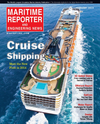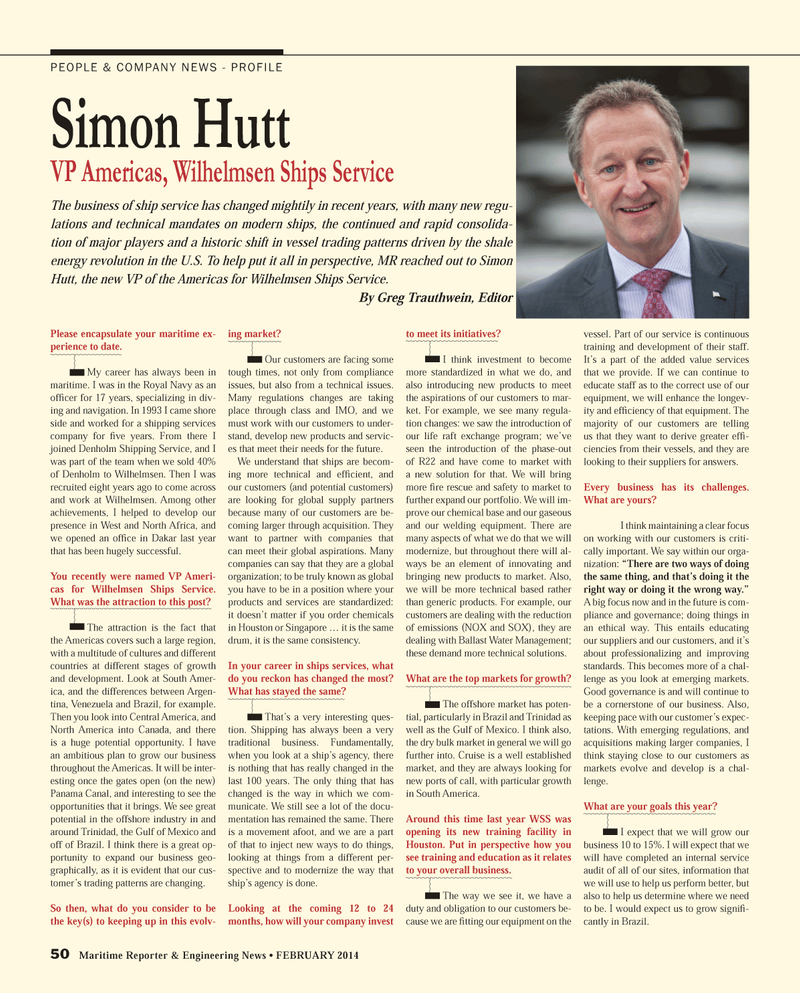
Page 50: of Maritime Reporter Magazine (February 2014)
Cruise Shipping Edition
Read this page in Pdf, Flash or Html5 edition of February 2014 Maritime Reporter Magazine
PEOPLE & COMPANY NEWS - PROFILE
Simon Hutt
VP Americas, Wilhelmsen Ships Service
Please encapsulate your maritime ex- perience to date. My career has always been in maritime. I was in the Royal Navy as an offi cer for 17 years, specializing in div- ing and navigation. In 1993 I came shore side and worked for a shipping services company for fi ve years. From there I joined Denholm Shipping Service, and I was part of the team when we sold 40% of Denholm to Wilhelmsen. Then I was recruited eight years ago to come across and work at Wilhelmsen. Among other achievements, I helped to develop our presence in West and North Africa, and we opened an offi ce in Dakar last year that has been hugely successful.
You recently were named VP Ameri- cas for Wilhelmsen Ships Service.
What was the attraction to this post? The attraction is the fact that the Americas covers such a large region, with a multitude of cultures and different countries at different stages of growth and development. Look at South Amer- ica, and the differences between Argen- tina, Venezuela and Brazil, for example.
Then you look into Central America, and
North America into Canada, and there is a huge potential opportunity. I have an ambitious plan to grow our business throughout the Americas. It will be inter- esting once the gates open (on the new)
Panama Canal, and interesting to see the opportunities that it brings. We see great potential in the offshore industry in and around Trinidad, the Gulf of Mexico and off of Brazil. I think there is a great op- portunity to expand our business geo- graphically, as it is evident that our cus- tomer’s trading patterns are changing.
So then, what do you consider to be the key(s) to keeping up in this evolv- ing market? Our customers are facing some tough times, not only from compliance issues, but also from a technical issues.
Many regulations changes are taking place through class and IMO, and we must work with our customers to under- stand, develop new products and servic- es that meet their needs for the future.
We understand that ships are becom- ing more technical and effi cient, and our customers (and potential customers) are looking for global supply partners because many of our customers are be- coming larger through acquisition. They want to partner with companies that can meet their global aspirations. Many companies can say that they are a global organization; to be truly known as global you have to be in a position where your products and services are standardized: it doesn’t matter if you order chemicals in Houston or Singapore … it is the same drum, it is the same consistency.
In your career in ships services, what do you reckon has changed the most?
What has stayed the same? That’s a very interesting ques- tion. Shipping has always been a very traditional business. Fundamentally, when you look at a ship’s agency, there is nothing that has really changed in the last 100 years. The only thing that has changed is the way in which we com- municate. We still see a lot of the docu- mentation has remained the same. There is a movement afoot, and we are a part of that to inject new ways to do things, looking at things from a different per- spective and to modernize the way that ship’s agency is done.
Looking at the coming 12 to 24 months, how will your company invest to meet its initiatives? I think investment to become more standardized in what we do, and also introducing new products to meet the aspirations of our customers to mar- ket. For example, we see many regula- tion changes: we saw the introduction of our life raft exchange program; we’ve seen the introduction of the phase-out of R22 and have come to market with a new solution for that. We will bring more fi re rescue and safety to market to further expand our portfolio. We will im- prove our chemical base and our gaseous and our welding equipment. There are many aspects of what we do that we will modernize, but throughout there will al- ways be an element of innovating and bringing new products to market. Also, we will be more technical based rather than generic products. For example, our customers are dealing with the reduction of emissions (NOX and SOX), they are dealing with Ballast Water Management; these demand more technical solutions.
What are the top markets for growth? The offshore market has poten- tial, particularly in Brazil and Trinidad as well as the Gulf of Mexico. I think also, the dry bulk market in general we will go further into. Cruise is a well established market, and they are always looking for new ports of call, with particular growth in South America.
Around this time last year WSS was opening its new training facility in
Houston. Put in perspective how you see training and education as it relates to your overall business. The way we see it, we have a duty and obligation to our customers be- cause we are fi tting our equipment on the vessel. Part of our service is continuous training and development of their staff.
It’s a part of the added value services that we provide. If we can continue to educate staff as to the correct use of our equipment, we will enhance the longev- ity and effi ciency of that equipment. The majority of our customers are telling us that they want to derive greater effi - ciencies from their vessels, and they are looking to their suppliers for answers.
Every business has its challenges.
What are yours? I think maintaining a clear focus on working with our customers is criti- cally important. We say within our orga- nization: “There are two ways of doing the same thing, and that’s doing it the right way or doing it the wrong way.”
A big focus now and in the future is com- pliance and governance; doing things in an ethical way. This entails educating our suppliers and our customers, and it’s about professionalizing and improving standards. This becomes more of a chal- lenge as you look at emerging markets.
Good governance is and will continue to be a cornerstone of our business. Also, keeping pace with our customer’s expec- tations. With emerging regulations, and acquisitions making larger companies, I think staying close to our customers as markets evolve and develop is a chal- lenge.
What are your goals this year? I expect that we will grow our business 10 to 15%. I will expect that we will have completed an internal service audit of all of our sites, information that we will use to help us perform better, but also to help us determine where we need to be. I would expect us to grow signifi - cantly in Brazil.
The business of ship service has changed mightily in recent years, with many new regu- lations and technical mandates on modern ships, the continued and rapid consolida- tion of major players and a historic shift in vessel trading patterns driven by the shale energy revolution in the U.S. To help put it all in perspective, MR reached out to Simon
Hutt, the new VP of the Americas for Wilhelmsen Ships Service.
By Greg Trauthwein, Editor 50 Maritime Reporter & Engineering News • FEBRUARY 2014
MR #2 (50-58).indd 50 2/4/2014 4:16:26 PM

 49
49

 51
51
